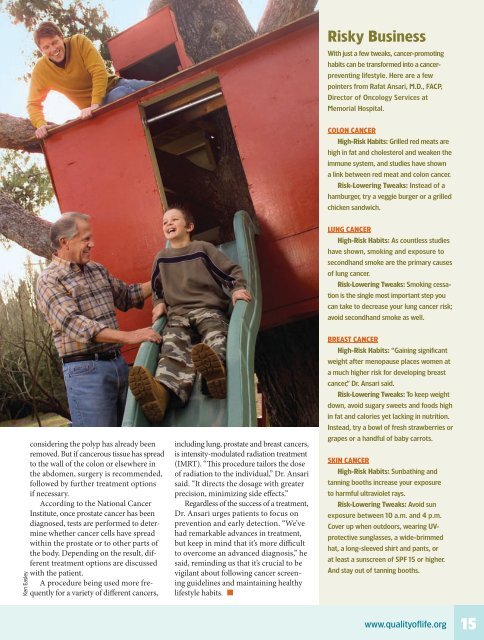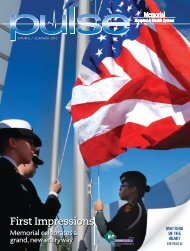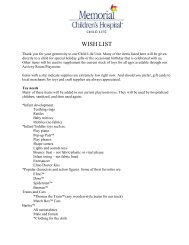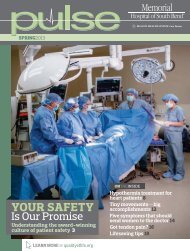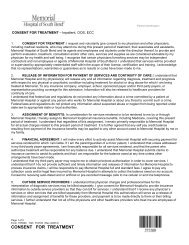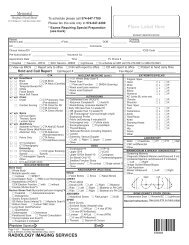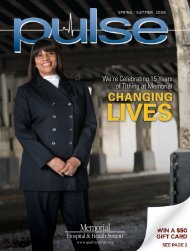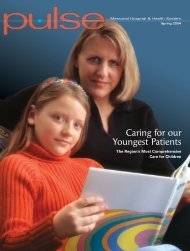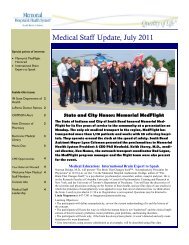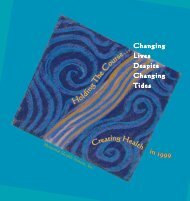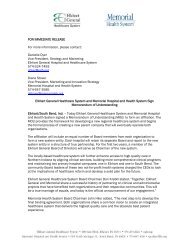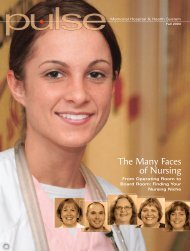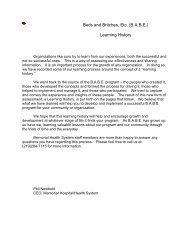Fall 2005 - Memorial Hospital of South Bend
Fall 2005 - Memorial Hospital of South Bend
Fall 2005 - Memorial Hospital of South Bend
Create successful ePaper yourself
Turn your PDF publications into a flip-book with our unique Google optimized e-Paper software.
Risky Business<br />
With just a few tweaks, cancer-promoting<br />
habits can be transformed into a cancerpreventing<br />
lifestyle. Here are a few<br />
pointers from Rafat Ansari, M.D., FACP,<br />
Director <strong>of</strong> Oncology Services at<br />
<strong>Memorial</strong> <strong>Hospital</strong>.<br />
COLON CANCER<br />
High-Risk Habits: Grilled red meats are<br />
high in fat and cholesterol and weaken the<br />
immune system, and studies have shown<br />
a link between red meat and colon cancer.<br />
Risk-Lowering Tweaks: Instead <strong>of</strong> a<br />
hamburger, try a veggie burger or a grilled<br />
chicken sandwich.<br />
LUNG CANCER<br />
High-Risk Habits: As countless studies<br />
have shown, smoking and exposure to<br />
secondhand smoke are the primary causes<br />
<strong>of</strong> lung cancer.<br />
Risk-Lowering Tweaks: Smoking cessation<br />
is the single most important step you<br />
can take to decrease your lung cancer risk;<br />
avoid secondhand smoke as well.<br />
Ken Easley<br />
considering the polyp has already been<br />
removed. But if cancerous tissue has spread<br />
to the wall <strong>of</strong> the colon or elsewhere in<br />
the abdomen, surgery is recommended,<br />
followed by further treatment options<br />
if necessary.<br />
According to the National Cancer<br />
Institute, once prostate cancer has been<br />
diagnosed, tests are performed to determine<br />
whether cancer cells have spread<br />
within the prostate or to other parts <strong>of</strong><br />
the body. Depending on the result, different<br />
treatment options are discussed<br />
with the patient.<br />
A procedure being used more frequently<br />
for a variety <strong>of</strong> different cancers,<br />
including lung, prostate and breast cancers,<br />
is intensity-modulated radiation treatment<br />
(IMRT). “This procedure tailors the dose<br />
<strong>of</strong> radiation to the individual,” Dr. Ansari<br />
said. “It directs the dosage with greater<br />
precision, minimizing side effects.”<br />
Regardless <strong>of</strong> the success <strong>of</strong> a treatment,<br />
Dr. Ansari urges patients to focus on<br />
prevention and early detection. “We’ve<br />
had remarkable advances in treatment,<br />
but keep in mind that it’s more difficult<br />
to overcome an advanced diagnosis,” he<br />
said, reminding us that it’s crucial to be<br />
vigilant about following cancer screening<br />
guidelines and maintaining healthy<br />
lifestyle habits. ■<br />
BREAST CANCER<br />
High-Risk Habits: “Gaining significant<br />
weight after menopause places women at<br />
a much higher risk for developing breast<br />
cancer,” Dr. Ansari said.<br />
Risk-Lowering Tweaks: To keep weight<br />
down, avoid sugary sweets and foods high<br />
in fat and calories yet lacking in nutrition.<br />
Instead, try a bowl <strong>of</strong> fresh strawberries or<br />
grapes or a handful <strong>of</strong> baby carrots.<br />
SKIN CANCER<br />
High-Risk Habits: Sunbathing and<br />
tanning booths increase your exposure<br />
to harmful ultraviolet rays.<br />
Risk-Lowering Tweaks: Avoid sun<br />
exposure between 10 a.m. and 4 p.m.<br />
Cover up when outdoors, wearing UVprotective<br />
sunglasses, a wide-brimmed<br />
hat, a long-sleeved shirt and pants, or<br />
at least a sunscreen <strong>of</strong> SPF 15 or higher.<br />
And stay out <strong>of</strong> tanning booths.<br />
www.quality<strong>of</strong>life.org<br />
15


